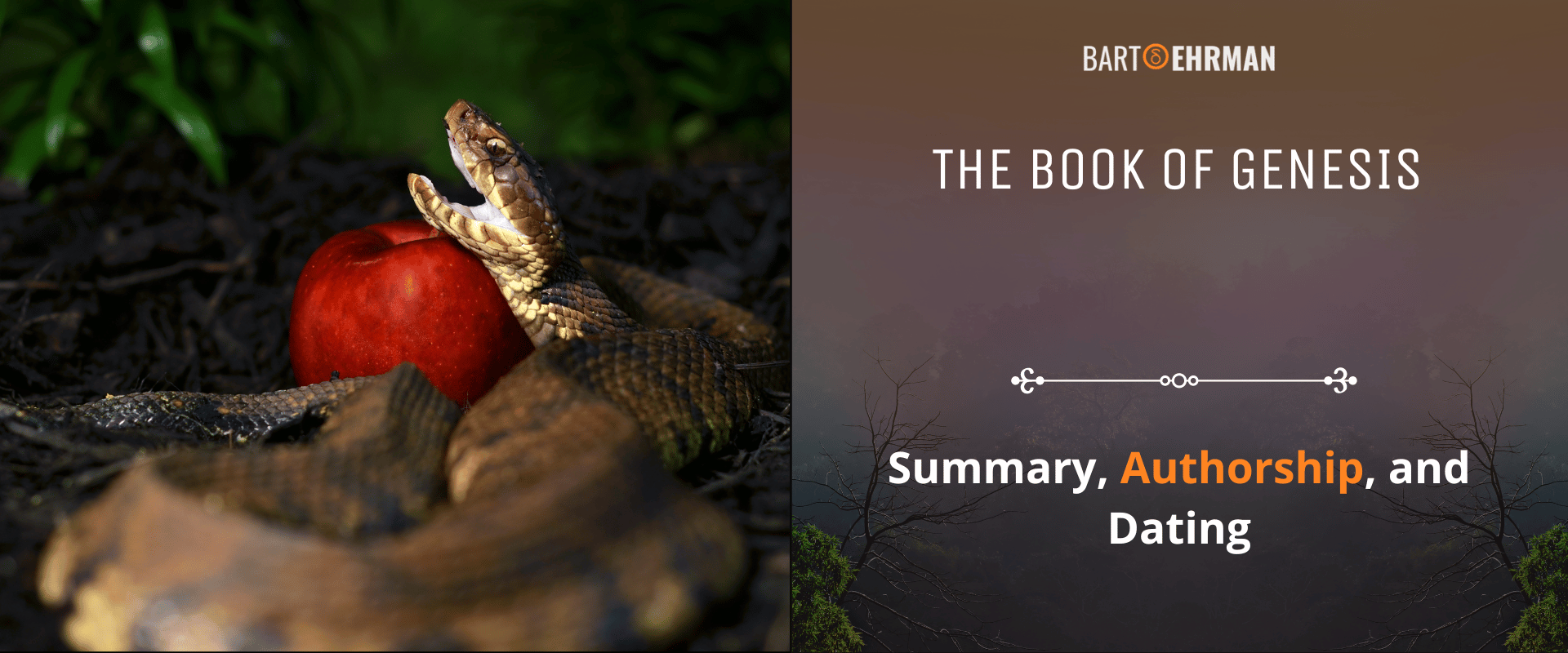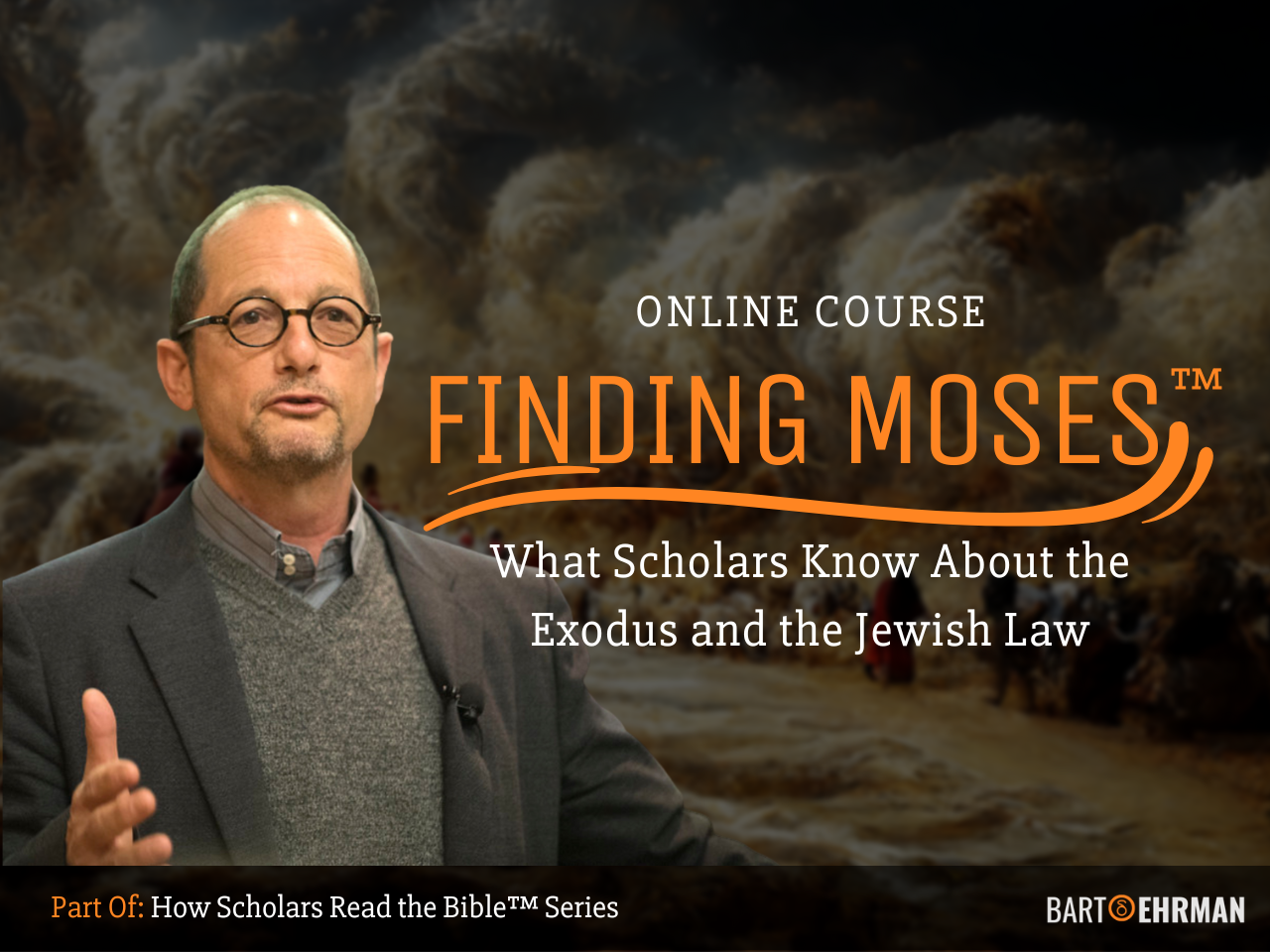The Book of Genesis: Summary, Authorship, and Dating

Written by Joshua Schachterle, Ph.D
Author | Professor | Scholar
Author | Professor | BE Contributor
Verified! See our editorial guidelines
Verified! See our guidelines
Date written: February 4th, 2024
Disclaimer: The views and opinions expressed in this article belong to the author and do not necessarily match my own. - Dr. Bart D. Ehrman
The Book of Genesis is one of the most fascinating books in the Bible. It’s the first biblical book in both the Jewish and Christian canons and describes the creation of the world and human beings, the origin of the Jewish people, and many other formative stories. What do scholars know about this book? In this article, I’ll dive into when it was written, what it’s about, and its significance in the canon.
By the way, the modern name of Genesis is from the same Greek word meaning “origin, creation, or generation.” The original Hebrew name of the book was Bereshit, which means “beginning” and is also the very first word of the book in Hebrew.

How is Genesis Structured?
Scholar John Van Seters says Genesis would have belonged to a literary genre called “antiquities” in the ancient world. This genre usually included the creation of a certain people as well as their prominent forebears, heroes, and some foundational genealogies. Most ancient Mediterranean civilizations composed such books to explain their own origins and establish or clarify their traditions.
Scholars divide Genesis into two main parts. The first is called “Primeval History” which goes from chapters 1-11. This includes the creation stories, the expulsion of Adam and Eve from the garden, Cain’s murder of Abel, Noah’s Ark, and the Tower of Babel.
The second section, comprising chapters 12-50, is called the “Patriarchal Age”. It includes all the stories of Abraham, Isaac, and Jacob, and ends with the story of Joseph in Egypt, which allows the next book, Exodus, to begin with the Jewish people living in Egypt.
Let’s look a little closer at the important stories in Genesis.
What Is the Book of Genesis About?
There are a lot of foundational stories in this book, but here is a quick and dirty summary of the book of Genesis.
Genesis starts with God’s creation of the world in six days, after which he rests on the seventh. We then have the two stories of the creation of humans, Adam and Eve, which we’ll look at later on.
Once Adam and Eve are placed in the superabundant Garden of Eden, God orders them not to eat from the tree of the knowledge of good and evil. But a serpent tricks Eve into eating from the tree and she persuades Adam to do the same. For this offense, God expels them from the garden, cursing Adam to survive only by hard work and cursing Eve to experience pain in childbirth.
Eve has two children, Cain and Abel. Cain works with agriculture and Abel with herding. They both bring the fruits of their labor to God as a sacrifice but God rejects Cain’s offering for no clear reason. This makes Cain bitter and he murders Abel, after which God curses Cain.
Many years later, the world has become corrupted and sinful and God decides to kill everyone and start over. According to the story, the only righteous man is Noah, so God decides to save him. He tells Noah to make an Ark, a giant boat, in which to place not only Noah’s family, but also two of every type of animal.
God then sends a destructive flood, killing everyone in the world except those in the Ark. Afterwards, God promises never to destroy the earth by flood again.
Then we have the story of humans working together to build a giant tower. God dislikes this and even seems to fear that humans will challenge him, so he divides the people, who had previously all spoken the same language, into different language groups. This causes them to abandon the tower, called Babel, and to scatter.
Next is the story of Abraham, a man God calls to leave the land of his birth and go to another land God will give him. God promises he will make Abraham the father of nations.
Abraham and his wife Sarah are already old and childless, but God promises he will give them a son. They don’t believe it, but Sarah indeed gets pregnant and bears a son, Isaac (Abraham had previously had a son, Ishmael, with his servant, who is then expelled when Isaac is born).
At one point, God tells Abraham to sacrifice Isaac. This is understandably upsetting to Abraham, but he shows his obedience to God by preparing to do it. Just before he kills Isaac, an angel stops his hand and Abraham is praised for his obedience.
Isaac goes on to marry Rebekah and have two sons, Jacob and Esau. Jacob later marries and has twelve sons. His favorite is Joseph, which makes the other sons jealous. As a result, the brothers sell Joseph into slavery in Egypt, telling Jacob that Joseph has been killed.
After some difficult experiences, Joseph becomes an important administrator in Egypt. When a famine occurs, Joseph’s brothers come to Egypt to beg for food and supplies. Joseph ultimately forgives his brothers, and they all settle in Egypt with him, setting the stage for the slavery of the Israelites in Egypt in Exodus.
What Do We Know About the Authorship of Genesis?
This is a simple question with a very complicated answer. It involves not only authors but kingdoms which had different traditions. These traditions were eventually merged into the book we have today. Let’s start there and explore the composition of Genesis.
Did Moses Write Genesis?
The book of Genesis is the first book of the Pentateuch, as the first five books of the Hebrew Bible are known. This includes Genesis, Exodus, Leviticus, Numbers, and Deuteronomy. Tradition says that Moses wrote these five books but the scholarly consensus is that Moses didn’t write any of them.
Instead, most scholars agree that there were three separate authors involved in creating the book of Genesis. In fact, it may make more sense to say that there are three separate literary traditions involved in the writing of Genesis. This is why, for example, some stories in Genesis are not only told more than once but have multiple versions.
These sources also came from different regions of what is now Israel.
Where and When Was Genesis Written?
Before we get into the sources themselves, we need to know a little about where they came from. What we now call Israel was actually split into two kingdoms in the 10th century BCE, with Israel as the northern kingdom and Judah as the southern kingdom. The different sources of Genesis we’ll discuss here come from traditions related to one or the other of those two kingdoms.
Judah was the kingdom of King David and his son Solomon. For this reason, sources from that region orient much of what they write, in Genesis and elsewhere, toward the eventual reign of David. Judah was conquered by Babylonia (in modern-day Iraq) in 597 BCE. Thus began a 70-year exile in Babylon for the Judahites. They were eventually allowed to return and rebuild, however.
Israel, on the other hand, had different traditions and a foundational king named Jeroboam. Israel was conquered by the Assyrians in 721 BCE. However, unlike Judah, Israel was essentially wiped out by the Assyrians and never rebuilt. Eventually, Judah took over both regions and the whole land was renamed Israel.
Having understood those two kingdoms and their effect on the traditions in Genesis, let’s explore our three sources. We will see that Genesis was written in order to establish and/or explain Jewish traditions after periods of exile.

Yahwist
Scholars call the first source the Yahwist source because it refers to God as “Yahweh”. Scholars usually abbreviate this source as “J” because the German transliteration of Yahweh begins with a J. I’ll use that abbreviation for the rest of this article. According to Joel Baden, J was written in the land of Judah and contributes the lion’s share of material in Genesis.
One of the ways scholars distinguish different sources in Genesis is that the different traditions called God by different names. But the names of other characters are changed between sources as well. For example, in the J source material in Exodus, the Israelites conquer a people called the Canaanites. In another source we’ll talk about below, the same people are called Amorites. J calls the mountain where Moses receives the law from God Sinai. In another source, however, the same mountain is called Horeb.
While we don’t know the exact dates when the J material was written, scholars generally put its creation between the 10th and 9th centuries BCE. By the way, this puts it centuries later than Moses was supposed to have lived.
We know, as I mentioned above, that J wrote most of Genesis, including chapters 2–16, 18–22, 24–34, 38, and 49. However, remember when I said Genesis told the same stories more than once? This starts from the very beginning of the book.
For example, Genesis 1 gives an account of God’s creation of the world and everything in it in six days. But J didn’t write Genesis 1. J’s account of the creation begins in Genesis 2 and differs from Genesis 1.
Genesis 1 says that God created humans but doesn’t say how. Adam and Eve just appear at God’s insistence. But in Genesis 2, God forms a man from the dust of the earth and breathes life into him. Later he takes a rib from Adam and forms Eve.
Why would one book give two such different accounts? Because they represent two different traditions which were later put together in Genesis.
J goes on to write the story of Adam and Eve’s temptation by the serpent in the garden and their subsequent expulsion. He also writes the story of Noah, the Tower of Babel, and Abraham. These are, of course, foundational myths for Judaism, Christianity, and Islam.
So, since J contributes the most material, what are the other sources and what did they contribute to Genesis?
Elohist
Scholars call a second source for Genesis Elohist, abbreviated as “E” since this source calls God “Elohim”. E contributes much less to Genesis than J, although E contributes far more to the book of Exodus. E was written in the 9th century BCE in the northern kingdom of Israel and therefore emphasizes northern place names and heroes like Joshua.
We first see E’s handiwork in Genesis 20, which is part of the continuing story of Abraham and his wife Sarah. As I said before, E doesn’t contribute nearly as much material to the Pentateuch until the book of Exodus.
Priestly
The third source for Genesis is the Priestly source or “P”. It’s called Priestly because its main concerns are rules for priests involving ceremonies and cultic regulations. It was probably written sometime between the 6th and 5th centuries BCE, much later than the other two.
The earliest layer of this tradition was likely written in Judah. However, most of this source was written during the Babylonian exile. This would contribute to its focus on establishing traditions and genealogies. P wanted the exiles not to forget who they were and where they had come from.
P contributes the first creation story in Genesis 1. P also writes Adam’s genealogy in Genesis 5 and the genealogy of Shem in Genesis 11 which leads up to Abraham. In addition, P contributes Abraham’s covenant with God and a few other stories about Abraham, Isaac, and Jacob.
What is the Significance of Genesis for Jews and Christians?
For Jews, Genesis is literally an origin story and creates the foundation for the rest of the Hebrew Bible’s stories, writings, and prophecies, which is certainly why it is the first book in the canon. It begins from the creation of the world by Israel’s God and goes on to show how the Jewish people emerged from God’s promises to Abraham, the father of the Jews.
In short, Genesis shows how the Jewish people began and how they overcame adversity through the advocacy and power of their God.
Christianity began in Israel among Jews – including Jesus, of course – and was simply one sect of Judaism among many at its inception. As its traditions developed, however, theologians began to interpret the stories of Genesis and other books as proof texts for their Christian version of history.
Some interpreted the serpent in the garden, for example, as Satan, something the book itself never says. Paul, among others, interpreted the story of Adam and Eve’s sin as the entrance of the great power of sin into the world. A later theologian, Augustine, would interpret this as the corruption of the human soul with which all descendants of Adam, that is, every human, would then be born.
From this interpretation of the Genesis story, many went on to say that Jesus’ death and resurrection were the antidote to this sin initiated by Satan at the beginning of the world. In fact, many Christians still believe this.
If you’re interested in finding out more about Genesis, by the way, check out Bart Ehrman’s course In the Beginning: History, Legend, and Myth in the Pentateuch.
Conclusion
Genesis, the first book of the Bible, narrates the creation of the world and the early history of humanity, including the stories of Adam and Eve, Noah, and the Tower of Babel. It also details the patriarchal history of the Israelites, focusing on Abraham, Isaac, Jacob, and Joseph, ending with the Israelites in Egypt.
The book was written by three different sources coming from two different kingdoms. The majority of Genesis was written by the J or Yahwhist source, a Judean-based source responding to their exile in Babylon by writing down traditions and stories of their foundation for those rebuilding the destroyed Judah. The rest was written by the Elohist or E source from the ultimately doomed northern kingdom of Israel and the Priestly or P source in Judah, concerned principally with cultic regulations and traditions.
Genesis is foundational for both Jews and Christians. For Jews, it tells the stories of how Israel’s God created the world and how he used Abraham to found and establish their people with God’s help and guidance.
For Christians, the stories also tell how Satan brought sin into the world through Adam and Eve, corrupting all subsequent humans with sin for which Jesus’ death was the price of salvation.

